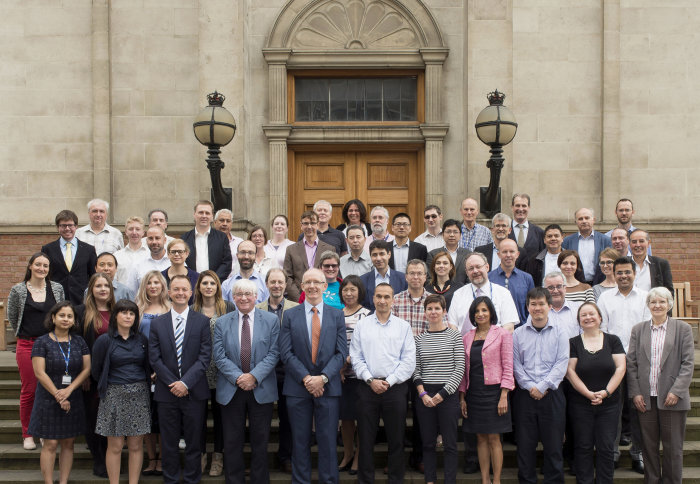Welcome to our new academic staff
by Sara West

This year we welcome three new academic staff to the Department of Chemical Engineering.
Dr Francesca Ceroni
 Dr Francesca Ceroni graduated in Pharmaceutical Biotechnologies from the University of Bologna, Italy, in 2007. She then obtained a PhD in Bioengineering from the same university in 2011. Her thesis examined the development of synthetic genetic devices in prokaryotic and eukaryotic cells for the control of cellular functions. In particular, she was interested in deepening the feasibility of a bottom-up approach in the design of synthetic circuits.
Dr Francesca Ceroni graduated in Pharmaceutical Biotechnologies from the University of Bologna, Italy, in 2007. She then obtained a PhD in Bioengineering from the same university in 2011. Her thesis examined the development of synthetic genetic devices in prokaryotic and eukaryotic cells for the control of cellular functions. In particular, she was interested in deepening the feasibility of a bottom-up approach in the design of synthetic circuits.
In 2010, she was Visiting Research Fellow in the Laboratory of Professor Pam Silver, in the Department of Systems Biology at the Harvard Medical School of Boston, USA. She worked together with Dr. Karmella Haynes to build a synthetic device for real-time detection of microRNAs in cancer cells at a single cell level.
In January 2013 Francesca joined Imperial College London as Research Associate in Synthetic Biology in the groups of Dr. Tom Ellis and Dr. Guy-Bart Stan within the Centre for Synthetic Biology, working in the Bioengineering Department. Her work aimed at examining the causes of cellular burden in Escherichia coli when transformed with foreign genetic devices in order to identify design rules for future synthetic systems.
In 2016 Francesca was awarded the prestigious Imperial College Junior Research Fellowship to pursue her interests in mammalian synthetic biology for bioproduction and healthcare applications working in the Chemical Engineering Department within the lab of Dr. Peter DiMaggio.
Dr Ali Yetisen
 Dr Yetisen completed his PhD in Chemical Engineering and Biotechnology at the University of Cambridge in 2014, following which he took a position as Postdoctoral Fellow in Biophotonics at Harvard University. Prior to joining Imperial College London he was a Principal Investigator and a Birmingham Fellow in the Institute of Translational Medicine and School of Chemical Engineering.
Dr Yetisen completed his PhD in Chemical Engineering and Biotechnology at the University of Cambridge in 2014, following which he took a position as Postdoctoral Fellow in Biophotonics at Harvard University. Prior to joining Imperial College London he was a Principal Investigator and a Birmingham Fellow in the Institute of Translational Medicine and School of Chemical Engineering.
His research focuses on nanotechnology, photonics, sensors, and biomaterials, particularly the development and validation of biophotonic medical devices for monitoring of high-risk individuals in clinical or point-of-care settings.
Dr Karen Polizzi
 Dr Polizzi’s research has always been at the interface of biology and chemical engineering. She has a multidisciplinary background, having completed her undergraduate degree in Biochemistry at the University of Maine and her PhD in Chemical and Biomolecular Engineering at the Georgia Institute of Technology.
Dr Polizzi’s research has always been at the interface of biology and chemical engineering. She has a multidisciplinary background, having completed her undergraduate degree in Biochemistry at the University of Maine and her PhD in Chemical and Biomolecular Engineering at the Georgia Institute of Technology.
In 2006 she moved to the UK to do postdoctoral research at the University of Exeter and loved the scientific atmosphere of the UK so much that she decided to move here permanently. In 2008, she joined the Department of Life Sciences at Imperial College London as an RCUK Fellow in Biopharmaceutical Processing, and was promoted to Senior Lecturer in 2015.
She currently works in the application of synthetic biology to biomanufacturing. One of the areas her group investigates is how we can use genetic circuits to spy on the activity of cells during bioproduction and develop strategies to overcome bottlenecks.
We are very pleased to welcome you to the department and look forward to working with you!
Article text (excluding photos or graphics) © Imperial College London.
Photos and graphics subject to third party copyright used with permission or © Imperial College London.
Reporter
Sara West
Communications Division